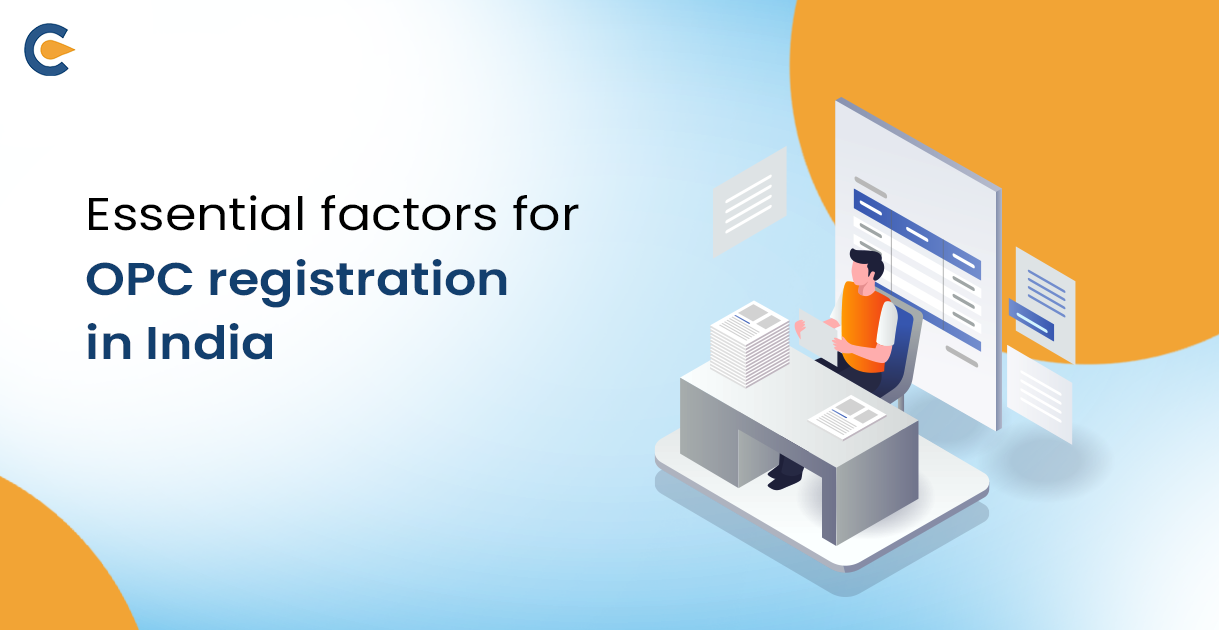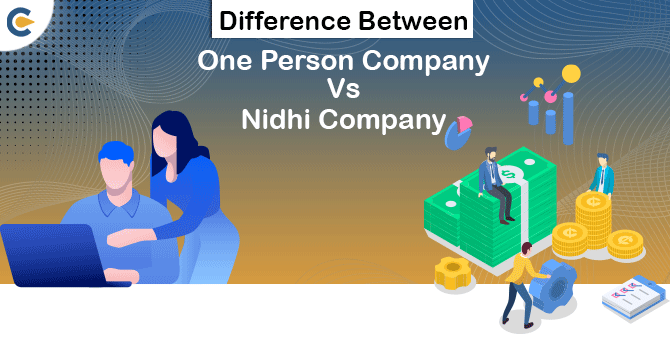The concept of One Person Company (OPC) in India was introduced in order to encourage entrepreneurs to come forward and do business in the country, leading to their collective growth as well as the nation. The concept of the One Person Company was first introduced in the United Kingdom and then in several other countries like the United States of America, Australia, Singapore, China, Turkey, UAE, and Pakistan.It was introduced in India by the report of Dr. J.J. Irani’s committee. The MSME sector has gained a lot of perks from the government, like lower taxes and easy funds through loans from banks/NBFCs, venture capitalists, angel investors, etc. This motivates the individuals to come into the market and register the company as One Person Company. OPC has all the advantages that are there for a private limited company, like perpetual succession, a separate legal entity, and also safeguarding personal assets from that of the company incorporated as OPC.
Section 2(62) of the Company’s Act 2013 talks about the Person Company and how only one member is enough to get it registered, and that can be the director of the company. The OPC registration process is quite easy in comparison to that of a Private Limited or a Public Company. The Legal Compliances for OPC registration are not very strict as the government itself wants to promote the culture of OPC. From time to time, the government comes up with new and easy policies to promote the growth of OPC. The norms of the OPC registration process are considerably easy.
Essential Factors for OPC Registration
The essential factors for OPC registration in India are-
- One of the important essential factors for OPC registration is that a natural person, being a citizen of India, is qualified to be the sole owner of the OPC.
- While registering the company as the OPC with the registrar of companies, there has to be a nomineeto comply with the essential factors for OPC registration.
- The person incorporating an OPC cannot incorporate any other OPC under his name and also cannot join any other OPC for any designation. He / She has to resign from either of the companies.
- The other essential factor for the OPC registration process in India is that a minor cannot incorporate an OPC; neither can they hold the shares nor be the nominee of the company.
- Any person after incorporating an OPC under his name cannot join others as a nominee within one hundred and eighty days of the incorporation as per the essential factors for OPC registration. In that case, he/she has to resign from any one of the OPCs.
- The company incorporated as an OPC cannot be changed into a Section 8 company, which is a non-profit company.
- The company incorporated as the OPC should not be involved in buying and purchasing the securities of other companies.
- The firm is banned from unilaterally changing its organizational form within two years of its establishment. It can be done when the company’s paid-up capital exceeds 50 lakh rupees or its average annual turnover for that relevant period exceeds two crore rupees.
- The Company shall mention One Person Company everywhere its name is mentioned.
These were some essential factors for the OPC registration process in India that need to be followed in order to meet the legal compliance requirements for OPC registration in the country. The Act doesn’t impose any harsh conditions for OPC registration in the country since the sole purpose of OPC registration is to increase the growth of small entrepreneurs and aid their business ideas. Failing to follow the essential factors for OPC registration one cannot incorporate his/ her company as per the Companies Act,2013.
Benefits of One Person Company
It is important to understand the main benefits of One Person Company as the government has made ample efforts to promote smaller businesses while understanding the essential factors for OPC registration and has specified ample benefits of One Person Company.
- Getting Statutory and Legal Status
After the Legal Compliance for OPC registration and meeting all the Essential factors for the OPC registration process, the registrar of the company administers the entity as legally incorporated, and this is one of the essential factors for OPC registration. This helps the company perform all the necessary things which are beneficial to its business easily and effectively. The legal status of the company means that the person incorporating does not have full liability for the losses of the company and is not personally liable for any loss incurred during the course of the business. Thus, only the company can be sued and not the person who incorporated it.
- Fundraising becomes easy
One of the advantages of OPC is that they can raise funds from the market very easily since Venture Capitalists and Angel Investors often look into these kinds of small businesses to invest their money in. Banks and NBFCs also provide them loans very easily since the loan is generally of a smaller quantity, making it easier to recover. They just need to comply with all the essential factors for OPC registration and their legal compliance for OPC registration.
- Fewer Compliances
The Companies Act of 2013 exempts the OPC from a few compliance requirements. The OPC does not have to prepare the cash flow statement. The company secretary is not required to sign the books of accounts and annual returns, which must be signed solely by the director, unlike in other types of companies.
- Simpler Incorporation
One of the essential factors for OPC registration is that an OPC is so simple to incorporate since it just requires one member and only one nominee, so the registrar of the company doesn’t have to keep a check on many documents or possible fraud. The member might also be a director. The minimum authorised capital for establishing an OPC is just Rs.1 lakh, although there is no minimum paid-up capital requirement for the same. As a result, it is considerably easier to incorporate than other types of companies.
- Easy Management
As there is only one person in the company who can be the director as well, the management becomes easy since not a lot of individuals are required, which makes it harder to communicate. This makes the decision-making power vested in a single person, who can make effective decisions in a quicker manner. Too many decision-makers often have conflicts amongst themselves, which eventually hampers the business.
- Perpetual Succession
The OPC has the concept of perpetual succession as it does in private companies. This means the person incorporating the company needs to appoint a nominee who will be able to succeed in the ownership title of the company. This gives the person a sense of security of assets before opting to go for the incorporation of the OPC.
Prerequisites For One-Person Company Registration
There are certain prerequisites for One Person Company registration in India that need to be followed apart from the essential factors for OPC registration in order to get the company incorporated and get the legal status. These are –
- There must be only one member for the registration.
- Before the incorporation of an OPC, a nominee of the company should be appointed by the director.
- Form INC-3 is there to get the consent of the nominee, provided that the nominee shouldn’t be a minor.
- As per the provisions led down in the Companies (Incorporation rules), 2014, the name of the company must be selected.
- An authorised capital of a minimum of Rs. 1,00,000 is required for the incorporation.
- The director’s DSC, along with the registered office proof of that company, is also needed.
Legal Compliance for OPC Registration
The company needs to follow legal compliance for OPC registration as well, according to The Company’s Act 2013. Certain necessary compliances need to be followed-
- There must be at least four board meetings in a year, and the duration between the two meetings should in no condition be less than 90 days. Minutes of the meeting should be recorded every time.
- The company’s books of accounts should be maintained properly.
- Financial statements should be audited regularly, and their records must be kept safe.
- The company’s income tax return should be filed every year on or before 30th September.
- Form AOC-4 needs to be filled out for financial statements, and Form MGT-7 is to be filled out for annual returns of the company to the registrar of the company.
Conclusion
To register the company under the Companies Act, 2013 one needs to comply with the essential factors for OPC registration as well as with the Legal Compliances for OPC registration. One Person Company is a great initiative to promote entrepreneurship in the country and in the coming days, we can see a higher number of OPC registrations in the country.
Corpbiz can help an individual get their OPC registered while following the essential factors for OPC registration and the necessary compliance. We have a strong foundation of a knowledgeable team who will guide you through the process.
Frequently Asked Questions
The approximate time for a company to be incorporated as a personal company is 10 days when the documentation and certification are done on time. It takes around one day to get the DSC and DIN of the director of the company, which is to be incorporated. If the process is done on time by the person responsible for doing so, then the certificate of incorporation can be obtained in approximately 3-5 days. After this, the company attains the legal status to run in the country.
No, the registrar of the company cannot incorporate any company under the Act if even one condition of the essential factors for OPC registration is not met. In order to incorporate a company, a person has to meet with all the conditions laid under the Act.
The Ministry of Corporate Affairs is the ministry that deals with the incorporation of all types of companies.
The Company Law Board along with the National Company Law Tribunal and National Company Law Appellate Tribunal is there to deal with matters of corporate disputes. In case of an appeal against the order of the National Company Law Appellate Tribunal, the party can appeal in the Supreme Court within forty-five days of passing of such order.
If a member of the OPC dies, in that case, the nominee gets all the rights transferred to his/ her name. However, it needs to be informed to the registrar of the company by filing form INC-4.
There are numerous advantages to a one-person company for both an individual as well as the government. For an individual, it gives a chance to be an entrepreneur, it brings livelihood, and it benefits the economy of the country. Apart from this, a One Person Company attains a legal and statutory status, there are simpler compliances for it to get registered and run a business, fundraising becomes easy in comparison to a private limited company, management is easy, and the concept of perpetual succession is also there.
If a person hasn’t complied with all the essential factors for OPC registration, he/she cannot run an OPC. Apart from this, a foreign citizen, any minor, a person barred from the law or a non-resident cannot be a member of a One Person Company.
Read Our Article: Fee For OPC Registration In India











